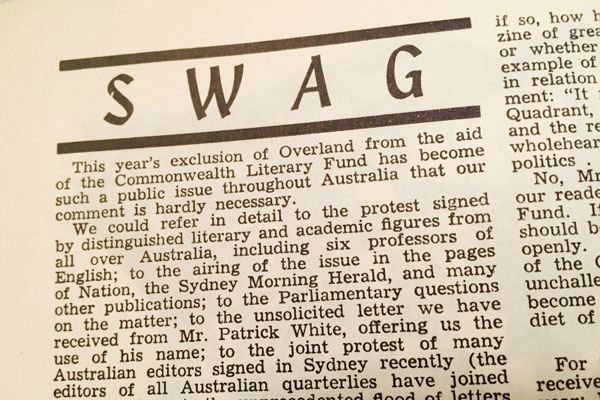On the same day that the Morrison government announced they were giving $500 million to defence so they can buy bigger guns (part of a $3 billion increase to the department), I learned that Overland was not invited to renew its four-year funding from federal arts body the Australia Council.
This funding round is supposed to give organisations certainty for the years between 2021 and 2024, as in we’re certain you can keep publishing, and also have time and space to start new projects. As you may have heard, two-thirds of the arts organisations that applied didn’t make it through the expression of interest stage.
Because it’s a brutally competitive process – one that pits peer organisations against each other instead of celebrating success across the arts – such news usually comes as a sense of relief that your own organisation made it through. In a better world, one where bigger guns weren’t considered more important than artistic contribution and opportunity, every organisation would receive funding. Our spaces and pages would be seen as integral to the production of art and literature each and every day.
Feedback from the panel of peers was that they liked what Overland does, but weren’t sure why we needed four-year funding to do it.
My response is: to continue all the programs and activities we already do, and to launch some new projects that build upon our existing work. But in the arts, the pressure is always to be more ambitious – to do more (if you don’t like our magazines, how about these books, these prizes, these partnerships), or something new or faddish (we will send a writer to the Moon!), or to constantly embellish without the need to provide evidence (we publish the best writing, we are the most diverse, we are the only publisher to produce X).
The four-year model is supposed to invest in the arts and organisations long-term, but now it seems more like it’s reinforcing the project model: prioritising new programs that are disposable, that will be abandoned for some different idea in the next funding round. There is no impetus on the peer panels – or any funding body, really – to maintain anything, outside of the Major Performing Arts Companies (for which the Australia Council quarantines 62% of its grants money each year). Perhaps it could be argued that organisations need to grow with ongoing funding – but given the pressure to only fund artists and new works, to what extent is that truly possible?
As anyone who works in the arts knows, no-one will give you money to keep the lights on, to keep producing ‘the great work you’re doing’, to keep to the fundamental purpose of your organisation. For literary magazines, this fundamental purpose is to publish. A disposable arts culture might work for the visual arts, due to the nature of, say, exhibitions, but it’s not how literature happens. In literature, mostly you keep doing the same thing: finding writers, working with writers, publishing writers. It is from these ordinary literary activities that extraordinary cultural works are produced.
As part of our EOI, we had proposed starting a new weekly publication dedicated to fiction that would have a series of ten rotating editors each year. The idea stemmed from the number of applications we receive from writers and editors wishing to curate one of our special editions, and the volume of short stories submitted for those editions.
One of the fundamental problems with the journal model at the moment is that it’s hard to be a writer and to experiment, or to make your stories politically or culturally responsive, when so little short fiction is being published. Such constraints have the fundamental effect of narrowing literature. We argued that we need fast, responsive places for short fiction, and to provide more spaces for editors and writers to be involved in curation and production.
At Overland, we spend a lot of time helping to develop writers and writing. They’re often newer writers, though not necessarily young. They’re not necessarily famous. Sometimes they’re single mothers or people historically excluded from literary production, sometimes simply because they have no publication record. We believe that artist development is key to removing barriers to participating in literature. But it can be hard to make this work seem exciting, because external forces – capitalism – want you to invest in young writers or superstar writers or novelty.
I absolutely believe that the real enemy of the arts is a federal government that places no emphasis on funding culture yet gives billions to the prospect of endless war and running concentration camps.
But if the Australia Council remains committed to the four-year model, perhaps it can still be improved upon. For established organisations, project funding is not an alternative to the four-year model, because it results in projects that are different and one-off. It’s a model that means orgs can’t commit to programs beyond that timeframe, or to supporting artists, not in any meaningful sense. Funding bodies can’t claim to be investing in Australian culture long-term, when the work you do is praised, but you are simultaneously criticised for wanting to be supported to do the work you do well.
Moreover, all at once and every four years is a tough ask for small-medium arts organisations, and there are some publications and groups that will vanish over the next few years. Opening the program every two years would mean organisations weren’t reliant on precarious project funding for extended periods of time.
Every two years would also allow a pool of people with organisational experience to be involved in the peer assessment process, because the skills and knowledge required to run an organisation are specialised. (Perhaps the Australia Council formed a panel like this, but it’s hard to say until April 2020, when the list of peers are released.)
The next few years will mean many more grant applications, uncertainty, anxiety and all that goes along with precarity. However, allow me to stress that this funding development, while disappointing, is not a horror story for Overland. We work hard so as to not rely on only one source of funding. We know that people like our work and you can be confident that it will continue.
#freethearts






